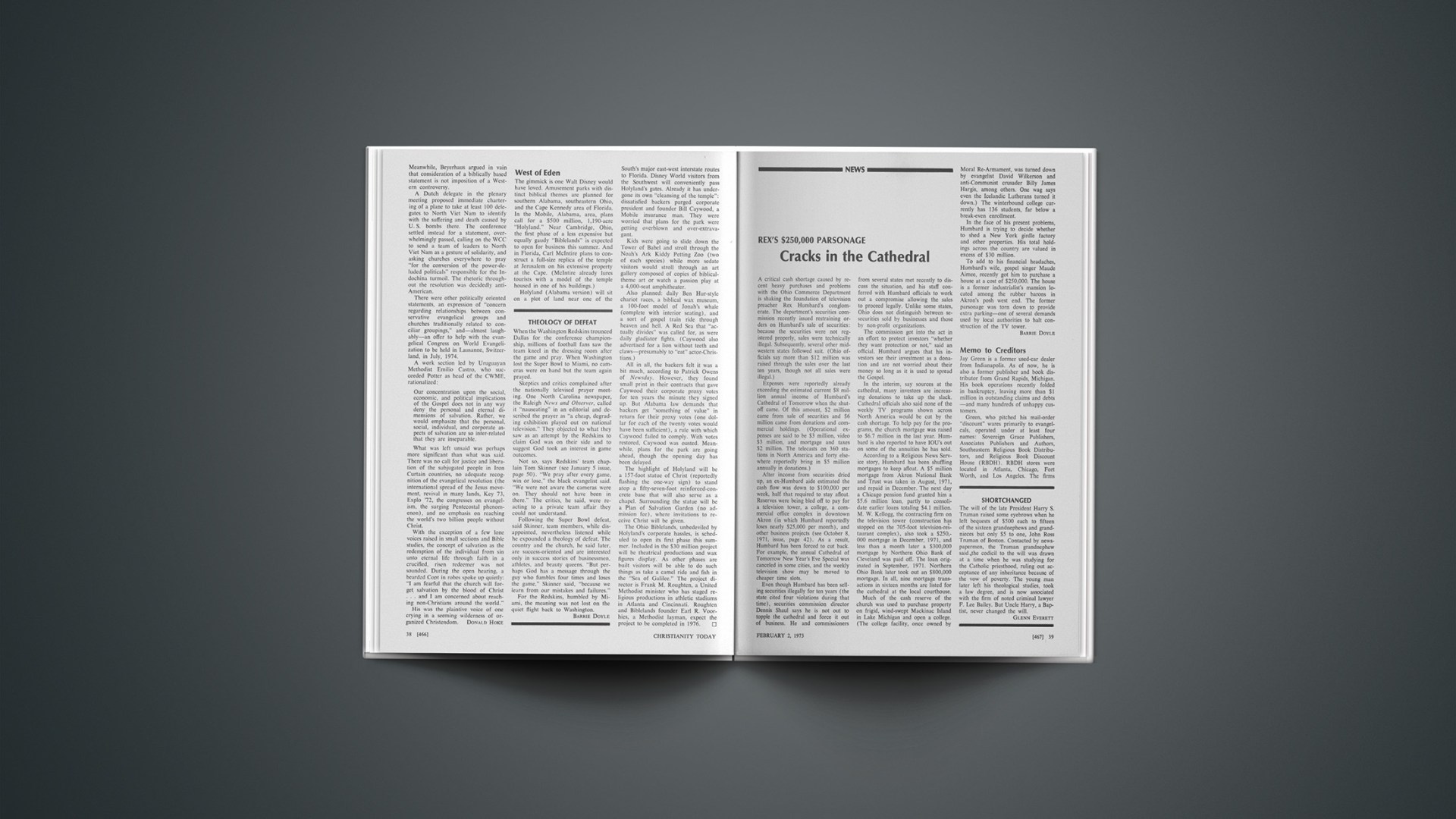While certain western neo-Protestants are equating God’s kingdom with Marxism—not unlike political clergy in Communist lands—eastern Europe shows signs of a noteworthy Christian renewal.
To be sure, differences between West and East become increasingly blurred. Welfare capitalism is a long way from free enterprise down the road toward socialism, and the contemporary secular stance in the West well on its way from theism to practical atheism.
Beyond doubt, a Big Power détente based on the renouncing of military aggression and forced imposition of any ideology is highly desirable. Yet simple recognition of existing deep doctrinal differences is a great distance down the pike from any stand for transcendent truth, and even from the insistency of utopian liberals and humanists that universal democracy was a twentieth-century political paraphrase for the kingdom.
President Nixon’s church attendance in Moscow was highly commendable and symbolically significant as a recognition by a great world political leader of the reality of God even in a land that officially debunks the supernatural as a myth. Yet neither in China nor in Russia did he make theistic commitments a basis for challenging the intellectual validity of the Communist world-view. If the public significance of theistic commitments is mitigated at home, one can hardly expect it to be proclaimed abroad.
One significant development in Communist lands, however, cannot but be indirectly nurtured by President Nixon’s church attendance, and that is the multiplying interest of the masses in evangelical broadcasting. The Communist-sphere response to evangelical radio programming in the last few years has been phenomenal. In some instances, in fact, Communist authorities have cooperated to widen broadcast opportunities.
There are remarkable differences among the various Soviet-sphere countries. Yugoslavia still stands out in this bloc for its considerable religious tolerance. In Poland, evangelicals have tactfully brushed aside periodic invitations from both Communists and Catholics to cooperate in order to resist and contain pressures by the other group. They have obtained permission for gospel broadcasts to Warsaw, and for mailing Scripture portions and spiritual counsel to inquirers. The lively response from western Russia, once part of Poland, attests a spiritual hunger there. In Poland itself, Roman Catholics have shown remarkable interest, and thousands have written concerning their recent experience of new birth. A broadcast is now devoted especially to Catholic listeners. While many restrictions remain, evangelicals in Poland may now—upon proper notice to authorities—hold ministerial conferences, publish approved quotas of literature, and hold Sunday school, young people’s meetings, and periodic baptismal services.
Evangelical broadcasting to the Soviet sphere is done by Trans World Radio, even when tapes are prepared by evangelicals in Warsaw or elsewhere. In the Soviet Union the number of short-wave receiving sets is thought to be more than 30 million. Some estimates place the number of Russians won to Christ through gospel broadcasting at one million, twice the number of evangelicals acknowledged by Russian authorities.
Young people are said to be more open now than in past years because of the continuing vacuum left by atheistic Communism in the lives of the masses. Multitudes who have shared in the Soviet-sphere redistribution of wealth are wondering where the Marxist kingdom went or when it will arrive. Among other unfulfilled guarantees, Communism has failed to eradicate religion—not surprisingly so, in view of man’s created nature and the inability of material things to satisfy his spiritual needs.
These figures and facts, however, do not all gainsay the torture, suffering, and restrictions still endured by countless evangelical Christians. While in no Communist land does the Communist party comprise more than 6 per cent of the population, it controls all military, government, educational, and mass-media posts. Not only does it aggressively propagandize against Christianity, but it discriminates against those who align themselves with the churches by depriving them of managerial posts and by limiting university opportunities for their children.
The vision of an era of justice and social righteousness has roots in the Old Testament prophets, and the Messianic inevitability of such a kingdom lies in the sovereign purpose of God. The Marxist picture of Christianity—“opium for the people”—is a caricature that gains unfortunate credence from those chapters in history when the Church has defended the status quo.
But the real reason Christianity hinders belief in the Marxist view is that it proclaims a transcendent objective source, stipulator, and support of what is morally right and true. Christianity has survived where Marxism has liquidated capitalistic economic structures and oppressed the Church of Christ. Marxist ideology cannot solve the fundamental human problems of individual meaning and worth, of suffering and death and destiny. Biblical Christianity exposes the atheistic worldview of Marxism as grounded in arbitrary speculation and devoid of objective norms, and dependent for acceptance upon human credulity and totalitarian imposition.
Marxists proclaimed an absolute confidence in man’s transformed social existence on the basis of dialectical materialism. Modernism meanwhile gave Christian doctrine a merely relative character; it substituted an empirical for a revelational concept of truth and the good, and scrapped the notion that supernatural regeneration is necessary for achieving God’s kingdom on earth. Modernism was far surer of the inevitable triumph of an earthly rule of socio-economic justice than of a transcendent eschatological kingdom. Much of the so-called Christian-Communist dialogue presupposes a givenness of Communism alongside the problematic future of the Church.
The intellectual tragedy common to both European kerygmatic theology and free-world philosophy is the lack of any rational basis for disputing the Communist world-view. Neither poses any effective challenge to alien theories of history, nature, or man.
Communism has repressed an open competition of ideas. But intellectuals and youth are showing signs of weariness with a totalitarian view that tells man what he must believe.
When freedom of debate and dissent emerge, Christianity may rise with surprising vitality. But if Christianity has implications for nature and history and society, those who attend church will need to wrestle openly the issues of transcendent truth and justice. That could put the fear of God into America and Russia both.










